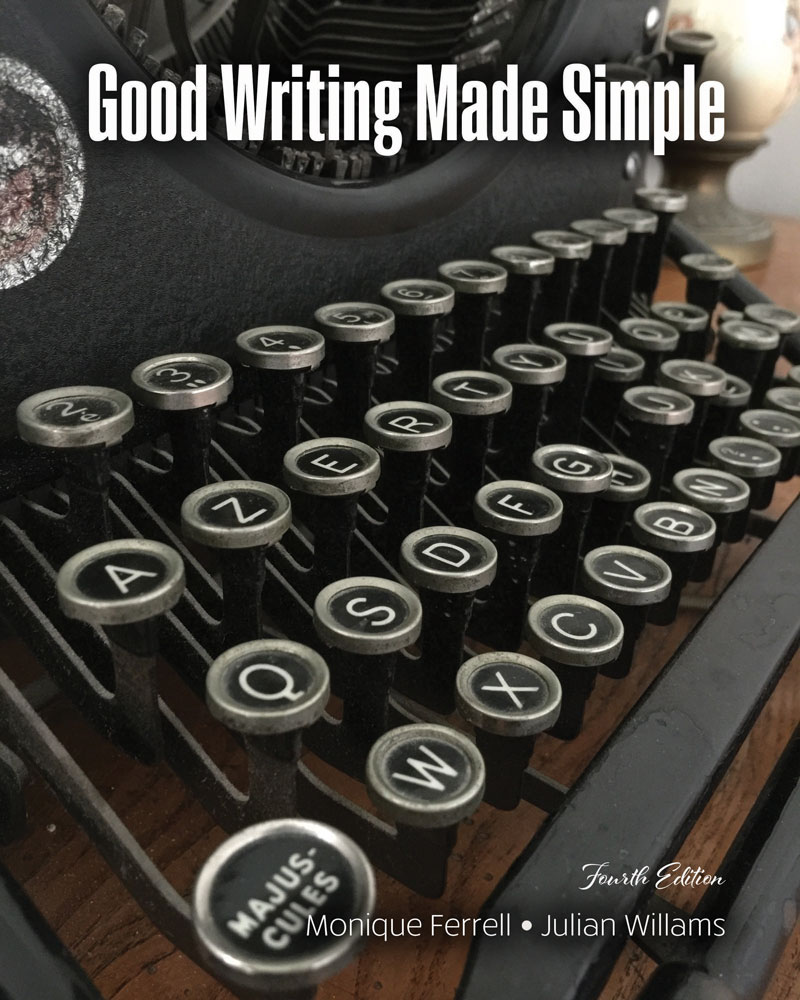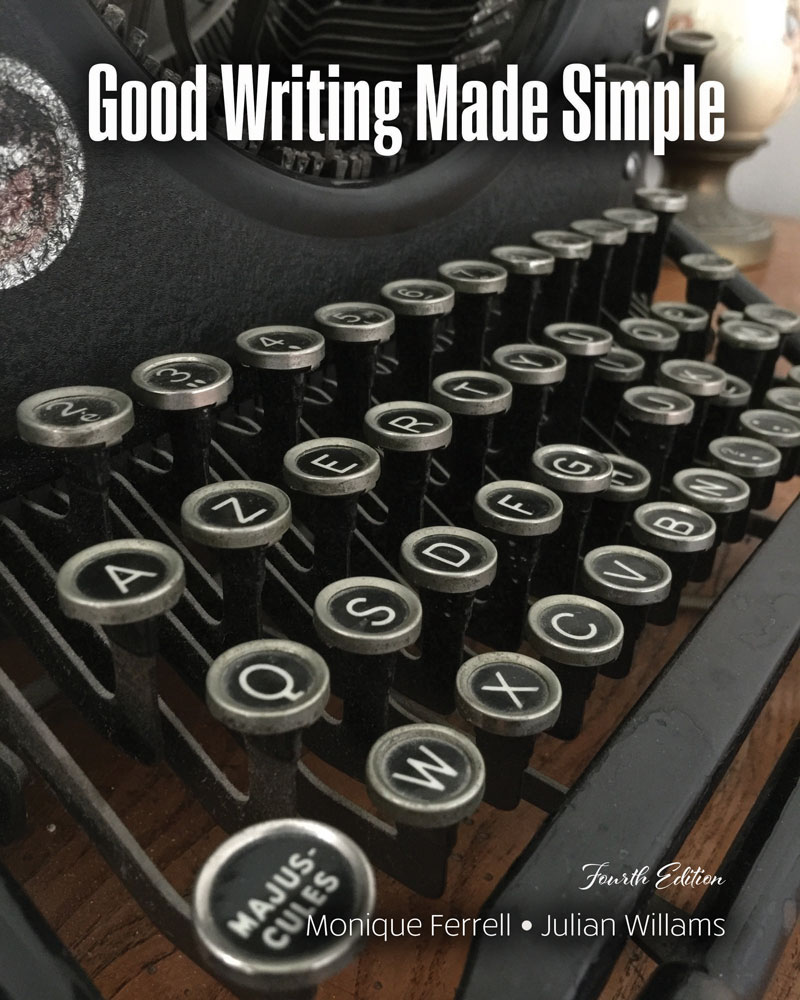Good Writing Made Simple
Author(s): Monique Ferrell , Julian Williams
Edition: 4
Copyright: 2018
Pages: 156
Edition: 4
Copyright: 2018
Pages: 156
Choose Your Format
The writing process inspires dread in countless students, and the underlying source of fear is almost always the same: “I’m just not a good writer.” Fortunately, Monique Ferrell and Julian Williams assure students in Good Writing Made Simple that writing is a learnable skill, just like anything else. And yes—anyone can do it!
Good Writing Made Simple delivers everything students need to succeed at college writing. Early chapters provide coverage on the foundations of crafting clear, understandable written ideas: Grammar and Syntax and Punctuation. After these topics, chapters on both The Writing Process and Writing the Research Essay show how to do everything from generating ideas to evaluating sources. With Ferrell and Williams dispelling common writing myths along the way, students will find the guidance to tackle their papers with knowledge and confidence.
Ferrell and Williams’ Good Writing Made Simple features:
- A detailed table of contents for easy reference.
- An initial chapter discussing how to tailor writing to a specific audience, including a discussion on misused words.
- Summary charts that condense writing and grammar rules, making them easy to view and comprehend.
- Exercise sections to practice newly-learned writing skills.
Preface
1: Words
Audience: Knowing What to Say and How to Say It
Why the Dictionary and Thesaurus Are Your Friends
Denotation and Connotation
Two Words or One?
Words That Have More Than One Spelling
Troublesome Words and Homophones
Words?
2: Grammar and Syntax
Rules of Engagement for Writing
Parts of Speech
Noun
Pronoun
Vague or Confusing Pronouns
Exercises
Sharpening Vague or Confusing Pronouns Verb
Action Verb
State-of-Being Verb
Helping Verb
Tense
Adjective
Restrictive and Non-Restrictive Modifiers
Adverb
Preposition
Conjunctions
Coordinating Conjunction
Subordinating Conjunction
Exercises
Relative Pronoun
Transitions
Conjunctive Adverbs
Interjection
Parts of a Sentence
Subject (Noun or Pronoun)
Predicate Verb
Object (Noun or Pronoun)
Direct Object
Indirect Object
Clause
Independent (also called Main or Major) Clause
Dependent (also called Subordinating Clause)
Phrase
Prepositional Phrase
Participle, Participial Phrase
Infinitive, Infinitive Phrase
Modifiers
Types of Sentences
Declarative Sentence
Interrogative Sentence
Imperative Sentence
Exclamatory Sentence
Sentence Structures
Simple Sentence
Compound Sentence
Complex Sentence
Compound-Complex Sentence
Parsing Sentences
Exercises
Identifying Subjects, Predicate Verbs, and Sentence Types Sentence Errors and How to Correct Them
Sentence Fragment
Exercises
Recognizing and Correcting Fragments Run-On Sentence
Types of Run-On Sentences
Simple Run-On
Comma Splice
Run-On Sentence or Comma Splice with a Conjunctive Adverb
Run-On Sentence or Comma Splice with an Ordinary Adverb
Exercises
Recognizing Run-Ons Choppy Sentences
Exercises
Correcting Choppy Sentences Rambling Sentence
Exercises
Faulty Connections
Faulty Parallelism
Exercises
Misplaced (Dangling) Modifier (MM)
Dangling Participle
Exercises
3: Punctuation
End Punctuation
Period
Question Mark
Exclamation Mark
Internal Punctuation
Comma (,)
Semicolon (;)
Colon (:)
Dash (—)
Parentheses ( )
The Slash /
Hyphen (-)
Apostrophe (’)
Apostrophes
Capitalization
Punctuation of Titles
Quotation Marks (“ ”)
Punctuation of Quotations
Special Punctuation Inside Quotations
Other Uses of Quotation Marks
Numbers
4: The Writing Process
Where Students Go Wrong
Types of Essays
The Foundation
Paragraph One: The Introduction
Paragraph Two: Body Paragraph
Paragraph Three: Body Paragraph
Paragraph Four: Body Paragraph
Paragraph Five: Conclusion
The Extended Essay
Structure of the Advanced Essay
Writing When Prompted
Closed and Open Essay Prompts
Freewriting
Constructing the Thesis Statement
Organizing Advanced Essay Writing
The Chart
The Topic
The Focus
The Purpose
The Audience
Tone
The 5 “W’s”
Example One
Example Two
Example Three (Text-Related Topic)
Three-Pronged Thesis Statement
The Scaffolding Format
The Question
The Quote
The Anecdote
Informational Development
Thesis Statement
The Final Product
Body Paragraphs
a. Topic Sentence
b. Explanation
c. Signal Phrase
d. Quoting
e. Note on the Quote
f. Transition Sentence
Sample Body Paragraph
The Conclusion
Titling an Original Essay
Patterns of Organization
Chronological Pattern
Emphatic Writing Pattern
Simple to Complex
Spatial
Writing Form
Description
Narration
Comparison and Contrast
Argumentative
Definition
Examples
Analogy
Cause and Effect
Process Analysis
Classification/Division
Literature vs Social Commentary
Editing Your Essay
Paper Guidelines
Peer Review
Proofreading
5: Writing the Research Essay
The Abstract
Secondary Sources
How to Evaluate Source Material
Finding Sources
Helpful Hints
Incorporating Material
Summarizing
The Annotated Bibliography
Paraphrasing
Quoting
Defining and Avoiding Plagiarism
Why Cite?
Common Knowledge and Paraphrasing
Documenting Your Sources
MLA Documentation
MLA Works Cited Page
Books
Articles in Newspapers and Periodicals
Online Sources, Films, TV, and Songs
Films/Movies
Song
Netflix, Amazon, Hulu, Etc.
The APA Style
APA Citations (for References page)
Books
Articles in Newspapers and Periodicals
Film
Interviews, email, and other personal communication
Chicago Manual Style of Writing
Sample Research Papers, Example of the Bibliography, and Cover Page
Sample Research Paper in MLA Style
Sample Works Cited Page in MLA Style
Constructing the Cover Page
Final Thoughts
The Editors
Monique Ferrell is an award-winning poet. Her writing has appeared in a number of poetry and fiction magazines, journals, and anthologies: American Poetry Review, North American Review, Antioch Review, New York Quarterly Review, Composing Poetry, Rabbit Ears, and Token Entry, among others. Ferrell has authored scholarly publications on writing, race, gender equality, and pop culture issues, including the forthcoming coauthored book Erotica, Intellect, and Godlike Transformation in Arthur Conan Doyle’s Sherlock Holmes and Dr. Watson. She is currently working on her first novel, Tuck, which focuses on the myth of Black maleness and responses to depression in African American families. www.moniqueferrell.com
Julian Williams is the author of multiple articles on race, gender, and popular culture. He is also the co-editor of several anthologies, including Her Own Worst Enemy: The Eternal Internal Gender Wars of Our Sisters and Lead, Follow, or Move Out of the Way: Global Perspectives in Literature and Film. His latest co-authored book—Erotica, Intellect, and God-like Transformation in Arthur Conan Doyle’s Sherlock Holmes and Dr. Watson is forthcoming. Using the pen name JL Williams, he is the author of the Emerson James mystery-detective fiction series. The first installment, Legacies, was published in 2016. He is currently working on the sequel, The Death of Dreams. www.iamemersonjames.com
The writing process inspires dread in countless students, and the underlying source of fear is almost always the same: “I’m just not a good writer.” Fortunately, Monique Ferrell and Julian Williams assure students in Good Writing Made Simple that writing is a learnable skill, just like anything else. And yes—anyone can do it!
Good Writing Made Simple delivers everything students need to succeed at college writing. Early chapters provide coverage on the foundations of crafting clear, understandable written ideas: Grammar and Syntax and Punctuation. After these topics, chapters on both The Writing Process and Writing the Research Essay show how to do everything from generating ideas to evaluating sources. With Ferrell and Williams dispelling common writing myths along the way, students will find the guidance to tackle their papers with knowledge and confidence.
Ferrell and Williams’ Good Writing Made Simple features:
- A detailed table of contents for easy reference.
- An initial chapter discussing how to tailor writing to a specific audience, including a discussion on misused words.
- Summary charts that condense writing and grammar rules, making them easy to view and comprehend.
- Exercise sections to practice newly-learned writing skills.
Preface
1: Words
Audience: Knowing What to Say and How to Say It
Why the Dictionary and Thesaurus Are Your Friends
Denotation and Connotation
Two Words or One?
Words That Have More Than One Spelling
Troublesome Words and Homophones
Words?
2: Grammar and Syntax
Rules of Engagement for Writing
Parts of Speech
Noun
Pronoun
Vague or Confusing Pronouns
Exercises
Sharpening Vague or Confusing Pronouns Verb
Action Verb
State-of-Being Verb
Helping Verb
Tense
Adjective
Restrictive and Non-Restrictive Modifiers
Adverb
Preposition
Conjunctions
Coordinating Conjunction
Subordinating Conjunction
Exercises
Relative Pronoun
Transitions
Conjunctive Adverbs
Interjection
Parts of a Sentence
Subject (Noun or Pronoun)
Predicate Verb
Object (Noun or Pronoun)
Direct Object
Indirect Object
Clause
Independent (also called Main or Major) Clause
Dependent (also called Subordinating Clause)
Phrase
Prepositional Phrase
Participle, Participial Phrase
Infinitive, Infinitive Phrase
Modifiers
Types of Sentences
Declarative Sentence
Interrogative Sentence
Imperative Sentence
Exclamatory Sentence
Sentence Structures
Simple Sentence
Compound Sentence
Complex Sentence
Compound-Complex Sentence
Parsing Sentences
Exercises
Identifying Subjects, Predicate Verbs, and Sentence Types Sentence Errors and How to Correct Them
Sentence Fragment
Exercises
Recognizing and Correcting Fragments Run-On Sentence
Types of Run-On Sentences
Simple Run-On
Comma Splice
Run-On Sentence or Comma Splice with a Conjunctive Adverb
Run-On Sentence or Comma Splice with an Ordinary Adverb
Exercises
Recognizing Run-Ons Choppy Sentences
Exercises
Correcting Choppy Sentences Rambling Sentence
Exercises
Faulty Connections
Faulty Parallelism
Exercises
Misplaced (Dangling) Modifier (MM)
Dangling Participle
Exercises
3: Punctuation
End Punctuation
Period
Question Mark
Exclamation Mark
Internal Punctuation
Comma (,)
Semicolon (;)
Colon (:)
Dash (—)
Parentheses ( )
The Slash /
Hyphen (-)
Apostrophe (’)
Apostrophes
Capitalization
Punctuation of Titles
Quotation Marks (“ ”)
Punctuation of Quotations
Special Punctuation Inside Quotations
Other Uses of Quotation Marks
Numbers
4: The Writing Process
Where Students Go Wrong
Types of Essays
The Foundation
Paragraph One: The Introduction
Paragraph Two: Body Paragraph
Paragraph Three: Body Paragraph
Paragraph Four: Body Paragraph
Paragraph Five: Conclusion
The Extended Essay
Structure of the Advanced Essay
Writing When Prompted
Closed and Open Essay Prompts
Freewriting
Constructing the Thesis Statement
Organizing Advanced Essay Writing
The Chart
The Topic
The Focus
The Purpose
The Audience
Tone
The 5 “W’s”
Example One
Example Two
Example Three (Text-Related Topic)
Three-Pronged Thesis Statement
The Scaffolding Format
The Question
The Quote
The Anecdote
Informational Development
Thesis Statement
The Final Product
Body Paragraphs
a. Topic Sentence
b. Explanation
c. Signal Phrase
d. Quoting
e. Note on the Quote
f. Transition Sentence
Sample Body Paragraph
The Conclusion
Titling an Original Essay
Patterns of Organization
Chronological Pattern
Emphatic Writing Pattern
Simple to Complex
Spatial
Writing Form
Description
Narration
Comparison and Contrast
Argumentative
Definition
Examples
Analogy
Cause and Effect
Process Analysis
Classification/Division
Literature vs Social Commentary
Editing Your Essay
Paper Guidelines
Peer Review
Proofreading
5: Writing the Research Essay
The Abstract
Secondary Sources
How to Evaluate Source Material
Finding Sources
Helpful Hints
Incorporating Material
Summarizing
The Annotated Bibliography
Paraphrasing
Quoting
Defining and Avoiding Plagiarism
Why Cite?
Common Knowledge and Paraphrasing
Documenting Your Sources
MLA Documentation
MLA Works Cited Page
Books
Articles in Newspapers and Periodicals
Online Sources, Films, TV, and Songs
Films/Movies
Song
Netflix, Amazon, Hulu, Etc.
The APA Style
APA Citations (for References page)
Books
Articles in Newspapers and Periodicals
Film
Interviews, email, and other personal communication
Chicago Manual Style of Writing
Sample Research Papers, Example of the Bibliography, and Cover Page
Sample Research Paper in MLA Style
Sample Works Cited Page in MLA Style
Constructing the Cover Page
Final Thoughts
The Editors
Monique Ferrell is an award-winning poet. Her writing has appeared in a number of poetry and fiction magazines, journals, and anthologies: American Poetry Review, North American Review, Antioch Review, New York Quarterly Review, Composing Poetry, Rabbit Ears, and Token Entry, among others. Ferrell has authored scholarly publications on writing, race, gender equality, and pop culture issues, including the forthcoming coauthored book Erotica, Intellect, and Godlike Transformation in Arthur Conan Doyle’s Sherlock Holmes and Dr. Watson. She is currently working on her first novel, Tuck, which focuses on the myth of Black maleness and responses to depression in African American families. www.moniqueferrell.com
Julian Williams is the author of multiple articles on race, gender, and popular culture. He is also the co-editor of several anthologies, including Her Own Worst Enemy: The Eternal Internal Gender Wars of Our Sisters and Lead, Follow, or Move Out of the Way: Global Perspectives in Literature and Film. His latest co-authored book—Erotica, Intellect, and God-like Transformation in Arthur Conan Doyle’s Sherlock Holmes and Dr. Watson is forthcoming. Using the pen name JL Williams, he is the author of the Emerson James mystery-detective fiction series. The first installment, Legacies, was published in 2016. He is currently working on the sequel, The Death of Dreams. www.iamemersonjames.com

